
OUTPUT DIGITALE: Esempio LED
Per provare il codice presentato in questa pagina occorre costruire il seguente circuito (serve una resistenza da 220 ohm e un led)

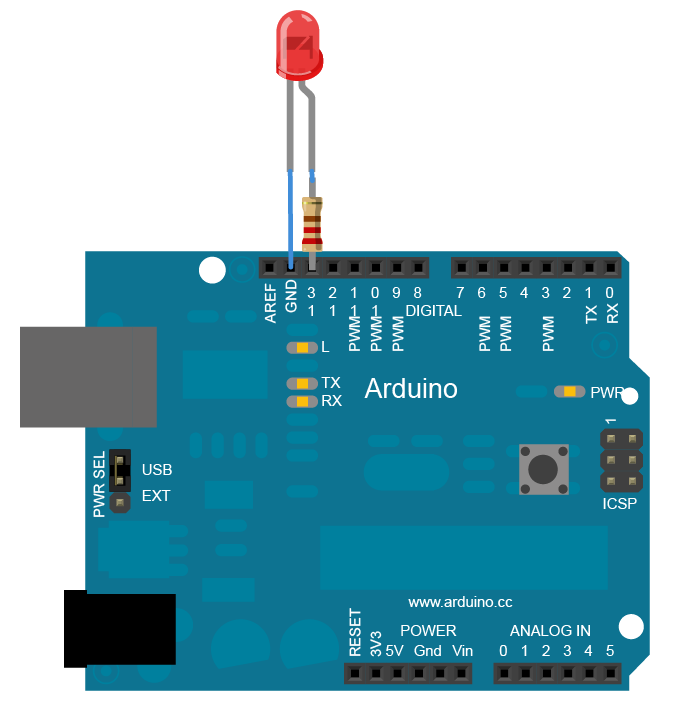
Ecco l'immagine del circuito
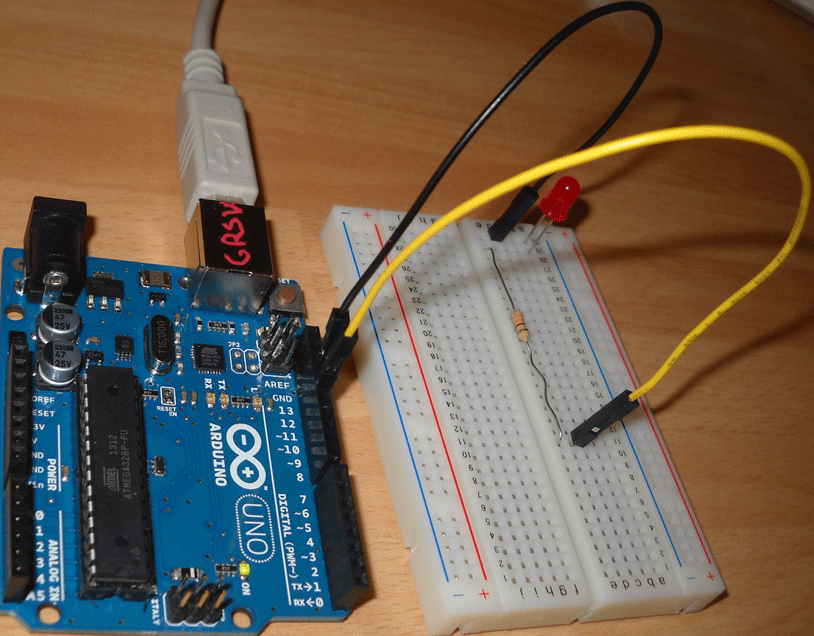
Codice Sorgente A
Obiettivo progetto: Utilizzando il circuito precedente accendere il led e spegnerlo ripetutamente ogni secondo
soluzione: Ecco il codice che risolve il nostro problema
/* -----------------------------------------------------------------------------------
Esempio creato partendo dal codice: Blink di pubblico dominio.
Accende e spegne un LED per 1 secondo ripetutamente
---------------------------------------------------------------------------------- */
int led = 13; // Il Pin 13 è quello connesso al LED
// La routine di "setup" parte appena premo il tasto di reset:
void setup()
{
// imposta il pin 13 come pin di OUTPUT.
pinMode(led, OUTPUT);
}
// La loop routine continua a girare:
void loop()
{
digitalWrite(led, HIGH); // Accende il LED impostando il voltaggio a HIGH
delay(1000); // attendo un secondo
digitalWrite(led, LOW); // spengo il LED impostando il voltaggio a LOW
delay(1000); // attendo un secondo
}
Codice Sorgente B
Obiettivo progetto: Utilizzando il circuito precedente accendere il led utilizzando i comandi mostrati nella figura sottostante all'interno del serial monitor
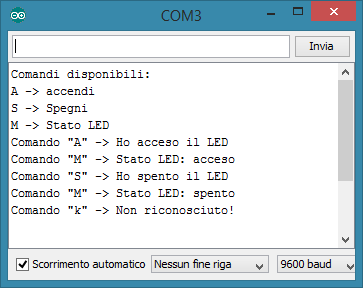
soluzione: Ecco il codice che risolve il nostro problema
/*
Esempio creato partendo dal codice Bernardo Giovanni - www.settorezero.com
Accende e spegne il LED connesso sulla porta 13 mediante un comando inviato
sulla porta seriale
*/
#define led 13 // Il Pin 13 è quello connesso al LED
char rx = 0; // variabile per contenere il carattere ricevuto
void setup()
{
Serial.begin(9600); // imposto la seriale per lavorare a 9600 baud
pinMode(led, OUTPUT); // imposta il pin 13 come pin di OUTPUT.
Serial.flush(); // Svuoto il buffer di ricezione seriale
Serial.println("Comandi disponibili:\nA -> accendi\nS -> Spegni\nM -> Stato LED");
}
void loop()
{
if (Serial.available() >0) // Controllo se il buffer di ricezione contiene qualcosa
{
rx = Serial.read(); // leggo il carattere ricevuto e lo memorizzo in rx
Serial.flush(); // svuoto il buffer di ricezione seriale
if (rx=='A' || rx=='a') // ho ricevuto la A maiuscola o minuscola
{
if (digitalRead(led) == LOW) // il led e' spento
{
digitalWrite(led,HIGH); // lo accendo
Serial.println("Comando \"A\" -> Ho acceso il LED");
}
else
Serial.println("Comando \"A\" -> Ignorato! Il LED e' acceso!");
}
else if (rx=='S' || rx=='s') // ho ricevuto la S maiuscola o minuscola
{
if (digitalRead(led) == HIGH) // il led è acceso
{
digitalWrite(led,LOW); // lo spengo
Serial.println("Comando \"S\" -> Ho spento il LED");
}
else
Serial.println("Comando \"S\" -> Ignorato! Il LED e' spento!");
}
else if (rx=='M' || rx=='m') // ho ricevuto la M maiuscola o minuscola
{
if (digitalRead(led) == HIGH) // il led era acceso?
Serial.println("Comando \"M\" -> Stato LED: acceso");
else
Serial.println("Comando \"M\" -> Stato LED: spento");
}
else // Ho ricevuto un altro carattere
{
Serial.print("Comando \"");
Serial.print((char)rx);
Serial.println("\" -> Non riconosciuto!");
}
}
}
Codice Sorgente C++ - DOS
Obiettivo progetto: Utilizzando il circuito precedente accendere il led utilizzando un'applicazione dos come mostrato nella figura sottostante
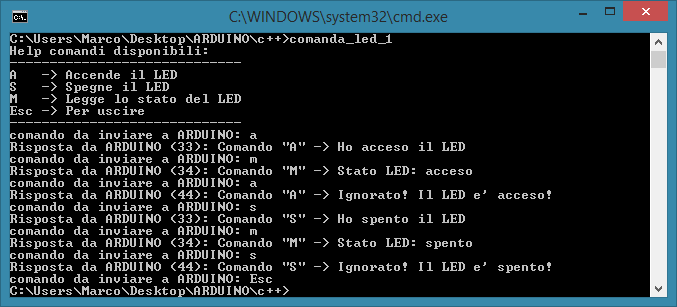
soluzione: Compiliamo il codice C++ della seguente applicazione DOS.Possiamo utilizzare per la compilazione l'ide DEV C++ (http://orwelldevcpp.blogspot.it/). Occorre eventualmente modificare la porta
#include <stdio.h>
#include <conio.h>
#include <windows.h>
#define PORTAARDUINO "com3:"
// Forwarding
HANDLE ApriSeriale();
void MostraMenu();
int LeggiComando();
int main()
{
HANDLE hComm;
DWORD n;
char Risposta[512]={'\0'};
int key;
hComm=ApriSeriale();
if (hComm != INVALID_HANDLE_VALUE)
{
MostraMenu();
while(1)
{
key=LeggiComando();
WriteFile(hComm, &key, 1,&n,NULL); // Invio il comando
Sleep(50); // attesa per leggere il risultato del comando
ReadFile(hComm, Risposta, 512, &n, NULL);
if (n!=0)
{
Risposta[n]='\0'; // terminatore di stringa
printf("\nRisposta da ARDUINO (%d): %s", n, Risposta);
printf("comando da inviare a ARDUINO: ");
}
}
CloseHandle(hComm);
}
}
/* --------------------------------------------------------------------
Funzione che continua a leggere da tastiera finché l'utente non
digita un comando digitato dall'utente
--------------------------------------------------------------------- */
int LeggiComando()
{
int key;
do {
key=getch();
if(key==27) { printf("Esc"); exit(0); }
if ( (key=='a') || (key=='A') || (key=='s') || (key=='S') || (key=='m') || (key=='M'))
{
putch(key);
return(key);
}
} while (1);
}
/* --------------------------------------------------------------------
Funzione che mostra il menu dei comandi
--------------------------------------------------------------------- */
void MostraMenu()
{
printf("Help comandi disponibili:\n");
printf("-----------------------------\n");
printf("A -> Accende il LED\n");
printf("S -> Spegne il LED\n");
printf("M -> Legge lo stato del LED\n");
printf("Esc -> Per uscire\n");
printf("-----------------------------\n");
printf("comando da inviare a ARDUINO: ");
}
/* --------------------------------------------------------------------
Funzione che apre la porta seriale
--------------------------------------------------------------------- */
HANDLE ApriSeriale()
{
HANDLE hComm;
hComm = CreateFile( PORTAARDUINO,
GENERIC_READ | GENERIC_WRITE,
0,
0,
OPEN_EXISTING,
0,//FILE_FLAG_OVERLAPPED,
0);
if (hComm == INVALID_HANDLE_VALUE)
{
printf("Porta seriale %s non disponibile!",PORTAARDUINO);
return INVALID_HANDLE_VALUE;
}
//SetupComm(hComm, 2, 128); // set buffer sizes
DCB config = {0};
if((GetCommState(hComm, &config) == 0))
{
printf("Lettura configurazione fallita!.");
return 0;
}
//config.DCBlength = sizeof(config);
config.BaudRate = CBR_9600;
config.Parity = NOPARITY;
// config.Parity = EVENPARITY;
config.StopBits = ONESTOPBIT;
config.ByteSize = DATABITS_8;
config.fAbortOnError = TRUE;
config.fOutX = FALSE; // XON/XOFF off for transmit
config.fInX = FALSE; // XON/XOFF off for receive
config.fDtrControl = DTR_CONTROL_DISABLE;
config.fRtsControl = RTS_CONTROL_DISABLE;
if (!SetCommState(hComm, &config))
{
printf( "Configurazione porta seriale fallita! Errore nr.: %d\n",GetLastError());
return(0);
}
// printf("Configurazione seriale corrente:\n Baud Rate %d\n Parity %d\n Byte Size %d\n Stop Bits %d\n\n",
// config.BaudRate, config.Parity, config.ByteSize, config.StopBits);
// Communication timeouts are optional
// Tell the program not to wait for data to show up
COMMTIMEOUTS timeouts={0};
GetCommTimeouts(hComm, &timeouts);
timeouts.ReadIntervalTimeout = MAXDWORD;
timeouts.ReadTotalTimeoutMultiplier = 0;
timeouts.ReadTotalTimeoutConstant = 0;
timeouts.WriteTotalTimeoutMultiplier = 0;
timeouts.WriteTotalTimeoutConstant = 0;
if (!SetCommTimeouts(hComm, &timeouts))
printf( "Configurazione dei timeouts fallita! Errore nr.: %d\n",GetLastError());
//SetCommMask(hComm,EV_RXCHAR);
return(hComm);
}
Codice Sorgente
VBA - XLSObiettivo progetto: Utilizzando il circuito precedente accendere il led utilizzando una macro Comanda_LED() in EXCEL implementata ad hoc come mostrato nella figura sottostante. Il sorgente caricato in Arduino resta lo stesso del precedente l'esempio B.
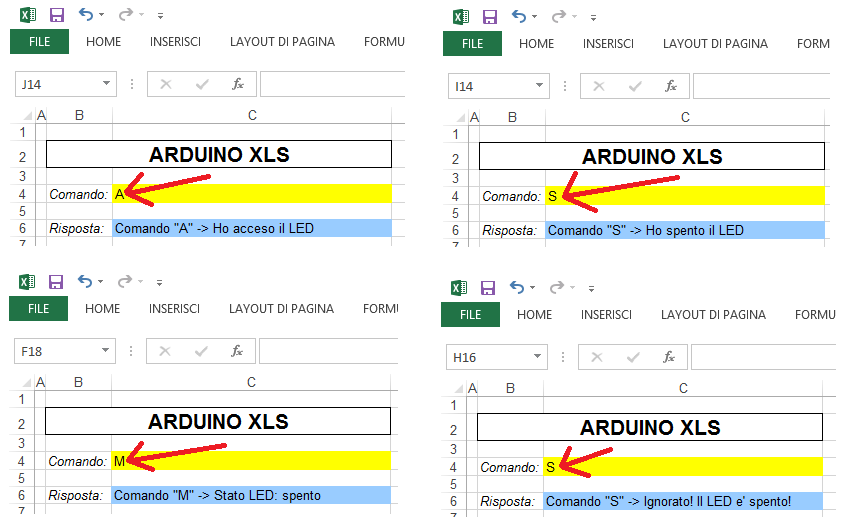
soluzione: tutto si basa sulla funzione personalizzata Comanda_LED()
Public Function Comanda_LED(Comando As String) as string
Dim lngStatus As Long
Dim Risposta As String
Dim intPortID As Integer
intPortID = 3 ' Porta utilizzata
If UCase(Comando) = "A" Or UCase(Comando) = "S" Or UCase(Comando) = "M" Then
Call Lib_Comm.CommOpen(intPortID, "COM" & intPortID, "baud=9600 parity=N data=8 stop=1")
lngStatus = CommWrite(intPortID, Comando)
Sleep (50) ' attesa per leggere il risultato del comando
lngStatus = CommRead(intPortID, Risposta, 100)
Call CommClose(intPortID)
Comanda_LED = Risposta
Else
Comanda_LED = ("Comando """ & Comando & """ Errato!")
End If
End Function
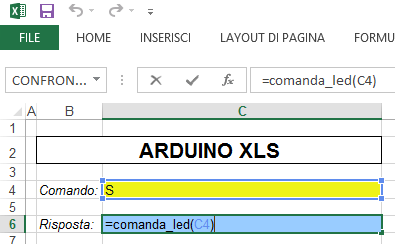
è possibile scaricare il file di esempio cliccando su questo link: arduino.xls.
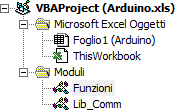
Al suo interno abbiamo la libreria Lib_Comm che consente la gestione
della comunicazione con la porta seriale.
Option Explicit
'-------------------------------------------------------------------------------
'
' This VB module is a collection of routines to perform serial port I/O without
' using the Microsoft Comm Control component. This module uses the Windows API
' to perform the overlapped I/O operations necessary for serial communications.
'
' The routine can handle up to 4 serial ports which are identified with a
' Port ID.
'
' All routines (with the exception of CommRead and CommWrite) return an error
' code or 0 if no error occurs. The routine CommGetError can be used to get
' the complete error message.
'-------------------------------------------------------------------------------
'-------------------------------------------------------------------------------
' Public Constants
'-------------------------------------------------------------------------------
' Output Control Lines (CommSetLine)
Const LINE_BREAK = 1
Const LINE_DTR = 2
Const LINE_RTS = 3
' Input Control Lines (CommGetLine)
Const LINE_CTS = &H10&
Const LINE_DSR = &H20&
Const LINE_RING = &H40&
Const LINE_RLSD = &H80&
Const LINE_CD = &H80&
'-------------------------------------------------------------------------------
' System Constants
'-------------------------------------------------------------------------------
Private Const ERROR_IO_INCOMPLETE = 996&
Private Const ERROR_IO_PENDING = 997
Private Const GENERIC_READ = &H80000000
Private Const GENERIC_WRITE = &H40000000
Private Const FILE_ATTRIBUTE_NORMAL = &H80
Private Const FILE_FLAG_OVERLAPPED = &H40000000
Private Const FORMAT_MESSAGE_FROM_SYSTEM = &H1000
Private Const OPEN_EXISTING = 3
' COMM Functions
Private Const MS_CTS_ON = &H10&
Private Const MS_DSR_ON = &H20&
Private Const MS_RING_ON = &H40&
Private Const MS_RLSD_ON = &H80&
Private Const PURGE_RXABORT = &H2
Private Const PURGE_RXCLEAR = &H8
Private Const PURGE_TXABORT = &H1
Private Const PURGE_TXCLEAR = &H4
' COMM Escape Functions
Private Const CLRBREAK = 9
Private Const CLRDTR = 6
Private Const CLRRTS = 4
Private Const SETBREAK = 8
Private Const SETDTR = 5
Private Const SETRTS = 3
'-------------------------------------------------------------------------------
' System Structures
'-------------------------------------------------------------------------------
Private Type COMSTAT
fBitFields As Long ' See Comment in Win32API.Txt
cbInQue As Long
cbOutQue As Long
End Type
Private Type COMMTIMEOUTS
ReadIntervalTimeout As Long
ReadTotalTimeoutMultiplier As Long
ReadTotalTimeoutConstant As Long
WriteTotalTimeoutMultiplier As Long
WriteTotalTimeoutConstant As Long
End Type
'
' The DCB structure defines the control setting for a serial
' communications device.
'
Private Type DCB
DCBlength As Long
BaudRate As Long
fBitFields As Long ' See Comments in Win32API.Txt
wReserved As Integer
XonLim As Integer
XoffLim As Integer
ByteSize As Byte
Parity As Byte
StopBits As Byte
XonChar As Byte
XoffChar As Byte
ErrorChar As Byte
EofChar As Byte
EvtChar As Byte
wReserved1 As Integer 'Reserved; Do Not Use
End Type
Private Type OVERLAPPED
Internal As Long
InternalHigh As Long
offset As Long
OffsetHigh As Long
hEvent As Long
End Type
Private Type SECURITY_ATTRIBUTES
nLength As Long
lpSecurityDescriptor As Long
bInheritHandle As Long
End Type
'-------------------------------------------------------------------------------
' System Functions
'-------------------------------------------------------------------------------
#If VBA7 Then
Public Declare PtrSafe Sub Sleep Lib "kernel32" (ByVal dwMilliseconds As LongPtr) 'For 64 Bit Systems
#Else
Public Declare Sub Sleep Lib "kernel32" (ByVal dwMilliseconds As Long) 'For 32 Bit Systems
#End If
'
' Fills a specified DCB structure with values specified in
' a device-control string.
'
Private Declare Function BuildCommDCB Lib "kernel32" Alias "BuildCommDCBA" _
(ByVal lpDef As String, lpDCB As DCB) As Long
'
' Retrieves information about a communications error and reports
' the current status of a communications device. The function is
' called when a communications error occurs, and it clears the
' device's error flag to enable additional input and output
' (I/O) operations.
'
Private Declare Function ClearCommError Lib "kernel32" _
(ByVal hFile As Long, lpErrors As Long, lpStat As COMSTAT) As Long
'
' Closes an open communications device or file handle.
'
Private Declare Function CloseHandle Lib "kernel32" (ByVal hObject As Long) As Long
'
' Creates or opens a communications resource and returns a handle
' that can be used to access the resource.
'
Private Declare Function CreateFile Lib "kernel32" Alias "CreateFileA" _
(ByVal lpFileName As String, ByVal dwDesiredAccess As Long, _
ByVal dwShareMode As Long, lpSecurityAttributes As Any, _
ByVal dwCreationDisposition As Long, ByVal dwFlagsAndAttributes As Long, _
ByVal hTemplateFile As Long) As Long
'
' Directs a specified communications device to perform a function.
'
Private Declare Function EscapeCommFunction Lib "kernel32" _
(ByVal nCid As Long, ByVal nFunc As Long) As Long
'
' Formats a message string such as an error string returned
' by anoher function.
'
Private Declare Function FormatMessage Lib "kernel32" Alias "FormatMessageA" _
(ByVal dwFlags As Long, lpSource As Any, ByVal dwMessageId As Long, _
ByVal dwLanguageId As Long, ByVal lpBuffer As String, ByVal nSize As Long, _
Arguments As Long) As Long
'
' Retrieves modem control-register values.
'
Private Declare Function GetCommModemStatus Lib "kernel32" _
(ByVal hFile As Long, lpModemStat As Long) As Long
'
' Retrieves the current control settings for a specified
' communications device.
'
Private Declare Function GetCommState Lib "kernel32" _
(ByVal nCid As Long, lpDCB As DCB) As Long
'
' Retrieves the calling thread's last-error code value.
'
Private Declare Function GetLastError Lib "kernel32" () As Long
'
' Retrieves the results of an overlapped operation on the
' specified file, named pipe, or communications device.
'
Private Declare Function GetOverlappedResult Lib "kernel32" _
(ByVal hFile As Long, lpOverlapped As OVERLAPPED, _
lpNumberOfBytesTransferred As Long, ByVal bWait As Long) As Long
'
' Discards all characters from the output or input buffer of a
' specified communications resource. It can also terminate
' pending read or write operations on the resource.
'
Private Declare Function PurgeComm Lib "kernel32" _
(ByVal hFile As Long, ByVal dwFlags As Long) As Long
'
' Reads data from a file, starting at the position indicated by the
' file pointer. After the read operation has been completed, the
' file pointer is adjusted by the number of bytes actually read,
' unless the file handle is created with the overlapped attribute.
' If the file handle is created for overlapped input and output
' (I/O), the application must adjust the position of the file pointer
' after the read operation.
'
Private Declare Function ReadFile Lib "kernel32" _
(ByVal hFile As Long, ByVal lpBuffer As String, _
ByVal nNumberOfBytesToRead As Long, ByRef lpNumberOfBytesRead As Long, _
lpOverlapped As OVERLAPPED) As Long
'
' Configures a communications device according to the specifications
' in a device-control block (a DCB structure). The function
' reinitializes all hardware and control settings, but it does not
' empty output or input queues.
'
Private Declare Function SetCommState Lib "kernel32" _
(ByVal hCommDev As Long, lpDCB As DCB) As Long
'
' Sets the time-out parameters for all read and write operations on a
' specified communications device.
'
Private Declare Function SetCommTimeouts Lib "kernel32" _
(ByVal hFile As Long, lpCommTimeouts As COMMTIMEOUTS) As Long
'
' Initializes the communications parameters for a specified
' communications device.
'
Private Declare Function SetupComm Lib "kernel32" _
(ByVal hFile As Long, ByVal dwInQueue As Long, ByVal dwOutQueue As Long) As Long
'
' Writes data to a file and is designed for both synchronous and a
' synchronous operation. The function starts writing data to the file
' at the position indicated by the file pointer. After the write
' operation has been completed, the file pointer is adjusted by the
' number of bytes actually written, except when the file is opened with
' FILE_FLAG_OVERLAPPED. If the file handle was created for overlapped
' input and output (I/O), the application must adjust the position of
' the file pointer after the write operation is finished.
'
Private Declare Function WriteFile Lib "kernel32" _
(ByVal hFile As Long, ByVal lpBuffer As String, _
ByVal nNumberOfBytesToWrite As Long, lpNumberOfBytesWritten As Long, _
lpOverlapped As OVERLAPPED) As Long
Private Declare Sub AppSleep Lib "kernel32" Alias "Sleep" (ByVal dwMilliseconds As Long)
'-------------------------------------------------------------------------------
' Program Constants
'-------------------------------------------------------------------------------
Private Const MAX_PORTS = 4
'-------------------------------------------------------------------------------
' Program Structures
'-------------------------------------------------------------------------------
Private Type COMM_ERROR
lngErrorCode As Long
strFunction As String
strErrorMessage As String
End Type
Private Type COMM_PORT
lngHandle As Long
blnPortOpen As Boolean
udtDCB As DCB
End Type
'-------------------------------------------------------------------------------
' Program Storage
'-------------------------------------------------------------------------------
Private udtCommOverlap As OVERLAPPED
Private udtCommError As COMM_ERROR
Private udtPorts(1 To MAX_PORTS) As COMM_PORT
'-------------------------------------------------------------------------------
' GetSystemMessage - Gets system error text for the specified error code.
'-------------------------------------------------------------------------------
Public Function GetSystemMessage(lngErrorCode As Long) As String
Dim intPos As Integer
Dim strMessage As String, strMsgBuff As String * 256
Call FormatMessage(FORMAT_MESSAGE_FROM_SYSTEM, 0, lngErrorCode, 0, strMsgBuff, 255, 0)
intPos = InStr(1, strMsgBuff, vbNullChar)
If intPos > 0 Then
strMessage = Trim$(Left$(strMsgBuff, intPos - 1))
Else
strMessage = Trim$(strMsgBuff)
End If
GetSystemMessage = strMessage
End Function
Public Function PauseApp(PauseInSeconds As Long)
Call AppSleep(PauseInSeconds * 1000)
End Function
'-------------------------------------------------------------------------------
' CommOpen - Opens/Initializes serial port.
'
'
' Parameters:
' intPortID - Port ID used when port was opened.
' strPort - COM port name. (COM1, COM2, COM3, COM4)
' strSettings - Communication settings.
' Example: "baud=9600 parity=N data=8 stop=1"
'
' Returns:
' Error Code - 0 = No Error.
'
'-------------------------------------------------------------------------------
Public Function CommOpen(intPortID As Integer, strPort As String, _
strSettings As String) As Long
Dim lngStatus As Long
Dim udtCommTimeOuts As COMMTIMEOUTS
On Error GoTo Routine_Error
' See if port already in use.
If udtPorts(intPortID).blnPortOpen Then
lngStatus = -1
With udtCommError
.lngErrorCode = lngStatus
.strFunction = "CommOpen"
.strErrorMessage = "Port in use."
End With
GoTo Routine_Exit
End If
' Open serial port.
udtPorts(intPortID).lngHandle = CreateFile(strPort, GENERIC_READ Or _
GENERIC_WRITE, 0, ByVal 0&, OPEN_EXISTING, FILE_ATTRIBUTE_NORMAL, 0)
If udtPorts(intPortID).lngHandle = -1 Then
lngStatus = SetCommError("CommOpen (CreateFile)")
GoTo Routine_Exit
End If
udtPorts(intPortID).blnPortOpen = True
' Setup device buffers (1K each).
lngStatus = SetupComm(udtPorts(intPortID).lngHandle, 1024, 1024)
If lngStatus = 0 Then
lngStatus = SetCommError("CommOpen (SetupComm)")
GoTo Routine_Exit
End If
' Purge buffers.
lngStatus = PurgeComm(udtPorts(intPortID).lngHandle, PURGE_TXABORT Or _
PURGE_RXABORT Or PURGE_TXCLEAR Or PURGE_RXCLEAR)
If lngStatus = 0 Then
lngStatus = SetCommError("CommOpen (PurgeComm)")
GoTo Routine_Exit
End If
' Set serial port timeouts.
With udtCommTimeOuts
.ReadIntervalTimeout = -1
.ReadTotalTimeoutMultiplier = 0
.ReadTotalTimeoutConstant = 1000
.WriteTotalTimeoutMultiplier = 0
.WriteTotalTimeoutMultiplier = 1000
End With
lngStatus = SetCommTimeouts(udtPorts(intPortID).lngHandle, udtCommTimeOuts)
If lngStatus = 0 Then
lngStatus = SetCommError("CommOpen (SetCommTimeouts)")
GoTo Routine_Exit
End If
' Get the current state (DCB).
lngStatus = GetCommState(udtPorts(intPortID).lngHandle, _
udtPorts(intPortID).udtDCB)
If lngStatus = 0 Then
lngStatus = SetCommError("CommOpen (GetCommState)")
GoTo Routine_Exit
End If
' Modify the DCB to reflect the desired settings.
lngStatus = BuildCommDCB(strSettings, udtPorts(intPortID).udtDCB)
If lngStatus = 0 Then
lngStatus = SetCommError("CommOpen (BuildCommDCB)")
GoTo Routine_Exit
End If
' Set the new state.
lngStatus = SetCommState(udtPorts(intPortID).lngHandle, _
udtPorts(intPortID).udtDCB)
If lngStatus = 0 Then
lngStatus = SetCommError("CommOpen (SetCommState)")
GoTo Routine_Exit
End If
lngStatus = 0
Routine_Exit:
CommOpen = lngStatus
Exit Function
Routine_Error:
lngStatus = Err.Number
With udtCommError
.lngErrorCode = lngStatus
.strFunction = "CommOpen"
.strErrorMessage = Err.Description
End With
Resume Routine_Exit
End Function
Private Function SetCommError(strFunction As String) As Long
With udtCommError
.lngErrorCode = Err.LastDllError
.strFunction = strFunction
.strErrorMessage = GetSystemMessage(.lngErrorCode)
SetCommError = .lngErrorCode
End With
End Function
Private Function SetCommErrorEx(strFunction As String, lngHnd As Long) As Long
Dim lngErrorFlags As Long
Dim udtCommStat As COMSTAT
With udtCommError
.lngErrorCode = GetLastError
.strFunction = strFunction
.strErrorMessage = GetSystemMessage(.lngErrorCode)
Call ClearCommError(lngHnd, lngErrorFlags, udtCommStat)
.strErrorMessage = .strErrorMessage & " COMM Error Flags = " & _
Hex$(lngErrorFlags)
SetCommErrorEx = .lngErrorCode
End With
End Function
'-------------------------------------------------------------------------------
' CommSet - Modifies the serial port settings.
'
' Parameters:
' intPortID - Port ID used when port was opened.
' strSettings - Communication settings.
' Example: "baud=9600 parity=N data=8 stop=1"
'
' Returns:
' Error Code - 0 = No Error.
'-------------------------------------------------------------------------------
Public Function CommSet(intPortID As Integer, strSettings As String) As Long
Dim lngStatus As Long
On Error GoTo Routine_Error
lngStatus = GetCommState(udtPorts(intPortID).lngHandle, _
udtPorts(intPortID).udtDCB)
If lngStatus = 0 Then
lngStatus = SetCommError("CommSet (GetCommState)")
GoTo Routine_Exit
End If
lngStatus = BuildCommDCB(strSettings, udtPorts(intPortID).udtDCB)
If lngStatus = 0 Then
lngStatus = SetCommError("CommSet (BuildCommDCB)")
GoTo Routine_Exit
End If
lngStatus = SetCommState(udtPorts(intPortID).lngHandle, _
udtPorts(intPortID).udtDCB)
If lngStatus = 0 Then
lngStatus = SetCommError("CommSet (SetCommState)")
GoTo Routine_Exit
End If
lngStatus = 0
Routine_Exit:
CommSet = lngStatus
Exit Function
Routine_Error:
lngStatus = Err.Number
With udtCommError
.lngErrorCode = lngStatus
.strFunction = "CommSet"
.strErrorMessage = Err.Description
End With
Resume Routine_Exit
End Function
'-------------------------------------------------------------------------------
' CommClose - Close the serial port.
'
' Parameters:
' intPortID - Port ID used when port was opened.
'
' Returns:
' Error Code - 0 = No Error.
'-------------------------------------------------------------------------------
Public Function CommClose(intPortID As Integer) As Long
Dim lngStatus As Long
On Error GoTo Routine_Error
If udtPorts(intPortID).blnPortOpen Then
lngStatus = CloseHandle(udtPorts(intPortID).lngHandle)
If lngStatus = 0 Then
lngStatus = SetCommError("CommClose (CloseHandle)")
GoTo Routine_Exit
End If
udtPorts(intPortID).blnPortOpen = False
End If
lngStatus = 0
Routine_Exit:
CommClose = lngStatus
Exit Function
Routine_Error:
lngStatus = Err.Number
With udtCommError
.lngErrorCode = lngStatus
.strFunction = "CommClose"
.strErrorMessage = Err.Description
End With
Resume Routine_Exit
End Function
'-------------------------------------------------------------------------------
' CommFlush - Flush the send and receive serial port buffers.
'
' Parameters:
' intPortID - Port ID used when port was opened.
'
' Returns:
' Error Code - 0 = No Error.
'-------------------------------------------------------------------------------
Public Function CommFlush(intPortID As Integer) As Long
Dim lngStatus As Long
On Error GoTo Routine_Error
lngStatus = PurgeComm(udtPorts(intPortID).lngHandle, PURGE_TXABORT Or _
PURGE_RXABORT Or PURGE_TXCLEAR Or PURGE_RXCLEAR)
If lngStatus = 0 Then
lngStatus = SetCommError("CommFlush (PurgeComm)")
GoTo Routine_Exit
End If
lngStatus = 0
Routine_Exit:
CommFlush = lngStatus
Exit Function
Routine_Error:
lngStatus = Err.Number
With udtCommError
.lngErrorCode = lngStatus
.strFunction = "CommFlush"
.strErrorMessage = Err.Description
End With
Resume Routine_Exit
End Function
'-------------------------------------------------------------------------------
' CommRead - Read serial port input buffer.
'
' Parameters:
' intPortID - Port ID used when port was opened.
' strData - Data buffer.
' lngSize - Maximum number of bytes to be read.
'
' Returns:
' Error Code - 0 = No Error.
'-------------------------------------------------------------------------------
Public Function CommRead(intPortID As Integer, strData As String, _
lngSize As Long) As Long
Dim lngStatus As Long
Dim lngRdSize As Long, lngBytesRead As Long
Dim lngRdStatus As Long, strRdBuffer As String * 1024
Dim lngErrorFlags As Long, udtCommStat As COMSTAT
On Error GoTo Routine_Error
strData = ""
lngBytesRead = 0
DoEvents
' Clear any previous errors and get current status.
lngStatus = ClearCommError(udtPorts(intPortID).lngHandle, lngErrorFlags, _
udtCommStat)
If lngStatus = 0 Then
lngBytesRead = -1
lngStatus = SetCommError("CommRead (ClearCommError)")
GoTo Routine_Exit
End If
If udtCommStat.cbInQue > 0 Then
If udtCommStat.cbInQue > lngSize Then
lngRdSize = udtCommStat.cbInQue
Else
lngRdSize = lngSize
End If
Else
lngRdSize = 0
End If
If lngRdSize Then
lngRdStatus = ReadFile(udtPorts(intPortID).lngHandle, strRdBuffer, _
lngRdSize, lngBytesRead, udtCommOverlap)
If lngRdStatus = 0 Then
lngStatus = GetLastError
If lngStatus = ERROR_IO_PENDING Then
' Wait for read to complete.
' This function will timeout according to the
' COMMTIMEOUTS.ReadTotalTimeoutConstant variable.
' Every time it times out, check for port errors.
' Loop until operation is complete.
While GetOverlappedResult(udtPorts(intPortID).lngHandle, _
udtCommOverlap, lngBytesRead, True) = 0
lngStatus = GetLastError
If lngStatus = ERROR_IO_INCOMPLETE Then
lngBytesRead = -1
lngStatus = SetCommErrorEx( _
"CommRead (GetOverlappedResult)", _
udtPorts(intPortID).lngHandle)
GoTo Routine_Exit
End If
Wend
Else
' Some other error occurred.
lngBytesRead = -1
lngStatus = SetCommErrorEx("CommRead (ReadFile)", _
udtPorts(intPortID).lngHandle)
GoTo Routine_Exit
End If
End If
strData = Left$(strRdBuffer, lngBytesRead)
End If
Routine_Exit:
CommRead = lngBytesRead
Exit Function
Routine_Error:
lngBytesRead = -1
lngStatus = Err.Number
With udtCommError
.lngErrorCode = lngStatus
.strFunction = "CommRead"
.strErrorMessage = Err.Description
End With
Resume Routine_Exit
End Function
'-------------------------------------------------------------------------------
' CommWrite - Output data to the serial port.
'
' Parameters:
' intPortID - Port ID used when port was opened.
' strData - Data to be transmitted.
'
' Returns:
' Error Code - 0 = No Error.
'-------------------------------------------------------------------------------
Public Function CommWrite(intPortID As Integer, strData As String) As Long
Dim i As Integer
Dim lngStatus As Long, lngSize As Long
Dim lngWrSize As Long, lngWrStatus As Long
On Error GoTo Routine_Error
' Get the length of the data.
lngSize = Len(strData)
' Output the data.
lngWrStatus = WriteFile(udtPorts(intPortID).lngHandle, strData, lngSize, _
lngWrSize, udtCommOverlap)
' Note that normally the following code will not execute because the driver
' caches write operations. Small I/O requests (up to several thousand bytes)
' will normally be accepted immediately and WriteFile will return true even
' though an overlapped operation was specified.
DoEvents
If lngWrStatus = 0 Then
lngStatus = GetLastError
If lngStatus = 0 Then
GoTo Routine_Exit
ElseIf lngStatus = ERROR_IO_PENDING Then
' We should wait for the completion of the write operation so we know
' if it worked or not.
'
' This is only one way to do this. It might be beneficial to place the
' writing operation in a separate thread so that blocking on completion
' will not negatively affect the responsiveness of the UI.
'
' If the write takes long enough to complete, this function will timeout
' according to the CommTimeOuts.WriteTotalTimeoutConstant variable.
' At that time we can check for errors and then wait some more.
' Loop until operation is complete.
While GetOverlappedResult(udtPorts(intPortID).lngHandle, _
udtCommOverlap, lngWrSize, True) = 0
lngStatus = GetLastError
If lngStatus = ERROR_IO_INCOMPLETE Then
lngStatus = SetCommErrorEx( _
"CommWrite (GetOverlappedResult)", _
udtPorts(intPortID).lngHandle)
GoTo Routine_Exit
End If
Wend
Else
' Some other error occurred.
lngWrSize = -1
lngStatus = SetCommErrorEx("CommWrite (WriteFile)", _
udtPorts(intPortID).lngHandle)
GoTo Routine_Exit
End If
End If
For i = 1 To 10
DoEvents
Next
Routine_Exit:
CommWrite = lngWrSize
Exit Function
Routine_Error:
lngStatus = Err.Number
With udtCommError
.lngErrorCode = lngStatus
.strFunction = "CommWrite"
.strErrorMessage = Err.Description
End With
Resume Routine_Exit
End Function
'-------------------------------------------------------------------------------
' CommGetLine - Get the state of selected serial port control lines.
'
' Parameters:
' intPortID - Port ID used when port was opened.
' intLine - Serial port line. CTS, DSR, RING, RLSD (CD)
' blnState - Returns state of line (Cleared or Set).
'
' Returns:
' Error Code - 0 = No Error.
'-------------------------------------------------------------------------------
Public Function CommGetLine(intPortID As Integer, intLine As Integer, _
blnState As Boolean) As Long
Dim lngStatus As Long
Dim lngComStatus As Long, lngModemStatus As Long
On Error GoTo Routine_Error
lngStatus = GetCommModemStatus(udtPorts(intPortID).lngHandle, lngModemStatus)
If lngStatus = 0 Then
lngStatus = SetCommError("CommReadCD (GetCommModemStatus)")
GoTo Routine_Exit
End If
If (lngModemStatus And intLine) Then
blnState = True
Else
blnState = False
End If
lngStatus = 0
Routine_Exit:
CommGetLine = lngStatus
Exit Function
Routine_Error:
lngStatus = Err.Number
With udtCommError
.lngErrorCode = lngStatus
.strFunction = "CommReadCD"
.strErrorMessage = Err.Description
End With
Resume Routine_Exit
End Function
'-------------------------------------------------------------------------------
' CommSetLine - Set the state of selected serial port control lines.
'
' Parameters:
' intPortID - Port ID used when port was opened.
' intLine - Serial port line. BREAK, DTR, RTS
' Note: BREAK actually sets or clears a "break" condition on
' the transmit data line.
' blnState - Sets the state of line (Cleared or Set).
'
' Returns:
' Error Code - 0 = No Error.
'-------------------------------------------------------------------------------
Public Function CommSetLine(intPortID As Integer, intLine As Integer, _
blnState As Boolean) As Long
Dim lngStatus As Long
Dim lngNewState As Long
On Error GoTo Routine_Error
If intLine = LINE_BREAK Then
If blnState Then
lngNewState = SETBREAK
Else
lngNewState = CLRBREAK
End If
ElseIf intLine = LINE_DTR Then
If blnState Then
lngNewState = SETDTR
Else
lngNewState = CLRDTR
End If
ElseIf intLine = LINE_RTS Then
If blnState Then
lngNewState = SETRTS
Else
lngNewState = CLRRTS
End If
End If
lngStatus = EscapeCommFunction(udtPorts(intPortID).lngHandle, lngNewState)
If lngStatus = 0 Then
lngStatus = SetCommError("CommSetLine (EscapeCommFunction)")
GoTo Routine_Exit
End If
lngStatus = 0
Routine_Exit:
CommSetLine = lngStatus
Exit Function
Routine_Error:
lngStatus = Err.Number
With udtCommError
.lngErrorCode = lngStatus
.strFunction = "CommSetLine"
.strErrorMessage = Err.Description
End With
Resume Routine_Exit
End Function
'-------------------------------------------------------------------------------
' CommGetError - Get the last serial port error message.
'
' Parameters:
' strMessage - Error message from last serial port error.
'
' Returns:
' Error Code - Last serial port error code.
'-------------------------------------------------------------------------------
Public Function CommGetError(strMessage As String) As Long
With udtCommError
CommGetError = .lngErrorCode
strMessage = "Error (" & CStr(.lngErrorCode) & "): " & .strFunction & _
" - " & .strErrorMessage
End With
End Function